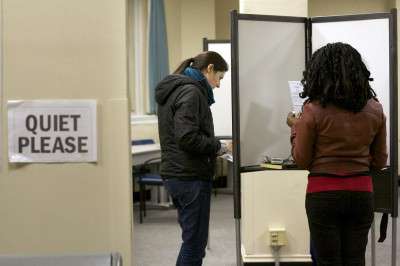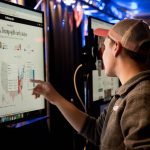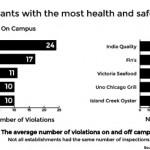
When Corbin Carter cast his ballot for the 2014 general election at 111 Cummington Mall on Tuesday, he said he was only one of two people at the polling booth.
“I live really close to campus…[but] I know for some other people, it gets complicated when they move apartments. They didn’t know where their polling place was,” said the Boston University School of Law third-year student. “I hope that undergraduates would come out, maybe being closer to classes.”
Carter said he researched the candidates and ballot questions before casting his vote.
“The attorney general and governor’s race were the big two,” he said. “I thought a lot of the ballot questions were also interesting. The casino one was important as well. I voted no because I think it’s important to have casinos here for both jobs and to increase revenue for the state that we’re losing to other states.”
However, not all students share Carter’s sentiment about voting and getting to know Massachusetts politics. In fact, several BU students said they recognized the importance of their civic duty, but also expressed apathy to the process because of registration hurdles and lack of attention from their peers.
Tobe Berkovitz, a professor of advertising in the College of Communication with expertise in gubernatorial election campaigns, said students are not a targeted demographic for candidates because some of the platforms do not appeal to them.
“Students don’t see what’s in it for them and how it will really affect them,” he said. “[U.S. President Barack] Obama made efforts to get young voters through big data and social media to target Millennials and students, but I don’t see them taking interest.”
A survey by the Harvard University Institute of Politics released Oct. 29 gauged attitudes of 18- to 24-year-old college undergraduates nationwide, and only 26 percent said they would “definitely” vote in the midterm elections. This is similar to the 2010 midterm elections when 27 percent said they would “definitely” be voting, according to an IOP poll from September 2010.
Berkovitz said trends in alternative ways to vote, such as early voting, absentee ballots and mail-in votes, allow for more participation from voters and could play an important part in political campaigns.
Samuel Mauri, a sophomore in the College of Arts and Sciences, said politicians should make more of an effort to encourage students to vote to combat some of their apathy.
“We as college students don’t have a lot of time or money, and so to someone who’s campaigning, that makes us to some extent less important, whereas older people can go knock on people’s doors and give a lot of money to a campaign,” he said.
Eva Dudzik, a junior in COM, said she voted in this election because of how passionate the candidates were about their causes.
“I’ve met all the candidates, and they’re all awesome, and I don’t really feel passionate about politics, but I really feel passionate about what they’re doing because I know so much about their platforms, and I think what they’re doing is important,” she said.
Dudzik said she worked at a company representing Democratic Attorney General candidate Maura Healey and Democratic Lt. Gov. candidate Steve Kerrigan.
Several students said they chose not to vote in the election because their voice would not have made a difference.
Kelsey Michelsen, a senior in the Sargent College of Health and Rehabilitation Sciences, said she feels pessimistic about voting because of how inefficient government can be.
“I’m not really concerned about politics,” she said. “I feel like no matter who gets elected, nothing is really going to change. I guess it seems like they don’t do anything anyway. Nothing gets passed. Nothing happens.”
Sharla Keough, a freshman in SAR, said she considers herself an Independent, who identifies with multiple platforms from both major political parties. She said she finds trouble keeping up with politics because of a lack of information available to her.
“I don’t have a TV, and I don’t read the newspaper, so I am not really sure about current events,” she said. “I do think it is important to vote because it is good to be informed, and we are at the age to vote, so why shouldn’t we have an opinion about what our government does and says?”
Anna Barnes, a freshman in the College of General Studies, said she wanted to get out and vote Tuesday on behalf of all college students.
“A lot of times, college students don’t get represented or are too busy,” she said. “A lot of us are out of state, but it’s really important to get our voice out there because it affects a lot of us. It’s important for our voice to be heard because we are adults, but we might not be taken seriously as adults.”
Sekar Krisnauli, Greg Yang, Stephanie Tran and Meiling Bedard contributed to the reporting of this story.
Vice Chairman and archives keeper for The Daily Free Press Board of Directors. Former news editor. I like data, politics, and higher education, but will write about anything.




